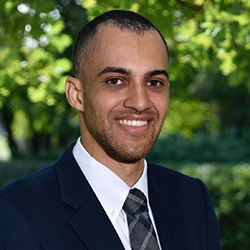PhD Alum Modibo Camara Wins ACM SIGecom Doctoral Dissertation Award

The award recognizes an outstanding dissertation in the field of economics and computation and includes an honorarium of $1,500.
Camara, who earned his PhD in economics, was jointly advised by Jason Hartline, professor of computer science at the McCormick School of Engineering, and Eddie Dekel, William R. Kenan Jr. Professor of Economics at Northwestern’s Weinberg College of Arts and Sciences.
“It was a privilege for us to have Modibo as a PhD student at Northwestern, where he was actively engaged with both computer science and economics,” Hartline said. “This award recognizes the exceptional importance of his thesis work. I expect him to become one of the leading minds of his generation.”
Camara is currently a Saieh Family Fellow at the University of Chicago's Becker-Friedman Institute and will join the Stanford Graduate School of Business as an assistant professor of economics in July.
His dissertation, titled “Complexities in Economic Theory,” leverages methodologies from computer science to understand sources of computational and informational complexity in economic theory. Camara’s work demonstrates that rational choices are at odds with computational complexity, that results under the common prior assumption can be robustly obtained as the outcomes of learning algorithms, and that a regulator may prefer to reduce choices to prevent decision makers from overfitting to data.
“Modibo’s thesis combines central concepts from computer science and economics in fundamentally new ways and with tremendous results,” Hartline said.
Camara previously won the ACM SIGecom Best Paper with a Student Lead Author and an Exemplary Theory Track Award at EC’22 for his paper “Computationally Tractable Choice.” The theoretical framework incorporates computational constraints into decision theory to examine how cognitive limitations and common heuristics affect behavior. Applying the Turing machine computational model to a general model of choice under risk, Camara demonstrated the potential value of computational tractability to economic theory and predictions about economic behavior.
Camara will be recognized at an award ceremony in July at the Twenty-Fourth ACM Conference on Economics and Computation (EC'23) at the King's College London, where he will also deliver a talk on his thesis work.
Hartline and Larry Samuelson, A. Douglas Melamed Professor of Economics and professor of management at Yale University, are the program co-chairs of EC'23.
